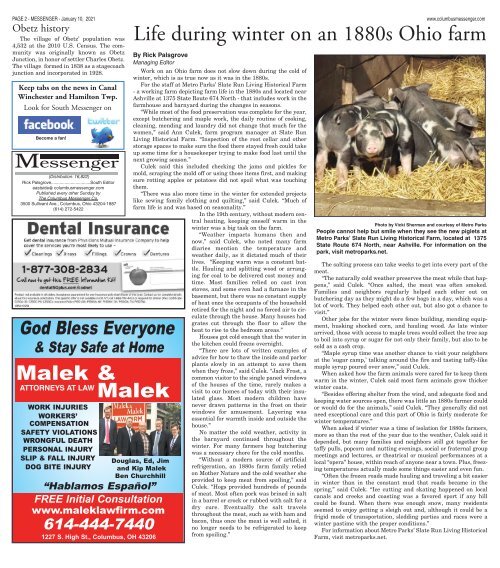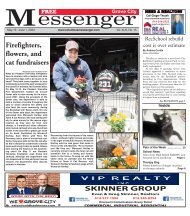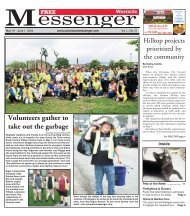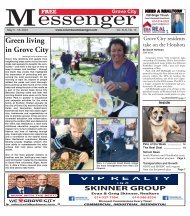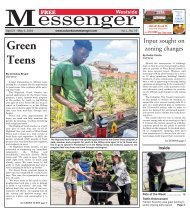Canal Winchester Messenger - January 10th, 2021
Create successful ePaper yourself
Turn your PDF publications into a flip-book with our unique Google optimized e-Paper software.
PAGE 2 - MESSENGER - <strong>January</strong> 10, <strong>2021</strong><br />
Obetz history<br />
The village of Obetz’ population was<br />
4,532 at the 2010 U.S. Census. The community<br />
was originally known as Obetz<br />
Junction, in honor of settler Charles Obetz.<br />
The village formed in 1838 as a stagecoach<br />
junction and incorporated in 1928.<br />
Keep tabs on the news in <strong>Canal</strong><br />
<strong>Winchester</strong> and Hamilton Twp.<br />
Look for South <strong>Messenger</strong> on<br />
Become a fan!<br />
eastside<br />
<strong>Messenger</strong><br />
(Distribution: 16,822)<br />
Rick Palsgrove................................South Editor<br />
eastside@ columbusmessenger.com<br />
Published every other Sunday by<br />
The Columbus <strong>Messenger</strong> Co.<br />
3500 Sullivant Ave., Columbus, Ohio 43204-1887<br />
(614) 272-5422<br />
www.columbusmessenger.com<br />
Life during winter on an 1880s Ohio farm<br />
By Rick Palsgrove<br />
Managing Editor<br />
God Bless Everyone<br />
& Stay Safe at Home<br />
Malek &<br />
ATTORNEYS AT LAW<br />
Malek<br />
WORK INJURIES<br />
WORKERS’<br />
COMPENSATION<br />
SAFETY VIOLATIONS<br />
WRONGFUL DEATH<br />
PERSONAL INJURY<br />
SLIP & FALL INJURY<br />
DOG BITE INJURY<br />
“Hablamos Español”<br />
FREE Initial Consultation<br />
www.maleklawfirm.com<br />
614-444-7440<br />
1227 S. High St., Columbus, OH 43206<br />
Work on an Ohio farm does not slow down during the cold of<br />
winter, which is as true now as it was in the 1880s.<br />
For the staff at Metro Parks’ Slate Run Living Historical Farm<br />
- a working farm depicting farm life in the 1880s and located near<br />
Ashville at 1375 State Route 674 North - that includes work in the<br />
farmhouse and barnyard during the changes in seasons.<br />
“While most of the food preservation was complete for the year,<br />
except butchering and maple work, the daily routine of cooking,<br />
cleaning, mending and laundry did not change that much for the<br />
women,” said Ann Culek, farm program manager at Slate Run<br />
Living Historical Farm. “Inspection of the root cellar and other<br />
storage spaces to make sure the food there stayed fresh could take<br />
up some time for a housekeeper trying to make food last until the<br />
next growing season.”<br />
Culek said this included checking the jams and pickles for<br />
mold, scraping the mold off or using those items first, and making<br />
sure rotting apples or potatoes did not spoil what was touching<br />
them.<br />
“There was also more time in the winter for extended projects<br />
like sewing family clothing and quilting,” said Culek. “Much of<br />
farm life is and was based on seasonality.”<br />
In the 19th century, without modern central<br />
heating, keeping oneself warm in the<br />
winter was a big task on the farm.<br />
“Weather impacts humans then and<br />
now,” said Culek, who noted many farm<br />
diaries mention the temperature and<br />
weather daily, as it dictated much of their<br />
lives. “Keeping warm was a constant battle.<br />
Hauling and splitting wood or arranging<br />
for coal to be delivered cost money and<br />
time. Most families relied on cast iron<br />
stoves, and some even had a furnace in the<br />
basement, but there was no constant supply<br />
of heat once the occupants of the household<br />
retired for the night and no forced air to circulate<br />
through the house. Many houses had<br />
grates cut through the floor to allow the<br />
Douglas, Ed, Jim<br />
and Kip Malek<br />
Ben Churchhill<br />
heat to rise to the bedroom areas.”<br />
Houses got cold enough that the water in<br />
the kitchen could freeze overnight.<br />
“There are lots of written examples of<br />
advice for how to thaw the inside and parlor<br />
plants slowly in an attempt to save them<br />
when they froze,” said Culek. “Jack Frost, a<br />
common visitor to the single paned windows<br />
of the houses of the time, rarely makes a<br />
visit to our homes of today with their insulated<br />
glass. Most modern children have<br />
never drawn patterns in the frost on their<br />
windows for amusement. Layering was<br />
essential for warmth inside and outside the<br />
house.”<br />
No matter the cold weather, activity in<br />
the barnyard continued throughout the<br />
winter. For many farmers hog butchering<br />
was a necessary chore for the cold months.<br />
“Without a modern source of artificial<br />
refrigeration, an 1880s farm family relied<br />
on Mother Nature and the cold weather she<br />
provided to keep meat from spoiling,” said<br />
Culek. “Hogs provided hundreds of pounds<br />
of meat. Most often pork was brined in salt<br />
in a barrel or crock or rubbed with salt for a<br />
dry cure. Eventually the salt travels<br />
throughout the meat, such as with ham and<br />
bacon, thus once the meat is well salted, it<br />
no longer needs to be refrigerated to keep<br />
from spoiling.”<br />
Photo by Vicki Sherman and courtesy of Metro Parks<br />
People cannot help but smile when they see the new piglets at<br />
Metro Parks’ Slate Run Living Historical Farm, located at 1375<br />
State Route 674 North, near Ashville. For information on the<br />
park, visit metroparks.net.<br />
The salting process can take weeks to get into every part of the<br />
meat.<br />
“The naturally cold weather preserves the meat while that happens,”<br />
said Culek. “Once salted, the meat was often smoked.<br />
Families and neighbors regularly helped each other out on<br />
butchering day as they might do a few hogs in a day, which was a<br />
lot of work. They helped each other out, but also got a chance to<br />
visit.”<br />
Other jobs for the winter were fence building, mending equipment,<br />
husking shocked corn, and hauling wood. As late winter<br />
arrived, those with access to maple trees would collect the tree sap<br />
to boil into syrup or sugar for not only their family, but also to be<br />
sold as a cash crop.<br />
“Maple syrup time was another chance to visit your neighbors<br />
at the ‘sugar camp,’ talking around the fire and tasting taffy-like<br />
maple syrup poured over snow,” said Culek.<br />
When asked how the farm animals were cared for to keep them<br />
warm in the winter, Culek said most farm animals grow thicker<br />
winter coats.<br />
“Besides offering shelter from the wind, and adequate food and<br />
keeping water sources open, there was little an 1880s farmer could<br />
or would do for the animals,” said Culek. “They generally did not<br />
need exceptional care and this part of Ohio is fairly moderate for<br />
winter temperatures.”<br />
When asked if winter was a time of isolation for 1880s farmers,<br />
more so than the rest of the year due to the weather, Culek said it<br />
depended, but many families and neighbors still got together for<br />
taffy pulls, popcorn and nutting evenings, social or fraternal group<br />
meetings and lectures, or theatrical or musical performances at a<br />
local “opera” house, within reach of anyone near a town. Plus, freezing<br />
temperatures actually made some things easier and even fun.<br />
“Often the frozen roads made hauling and traveling a bit easier<br />
in winter than in the constant mud that roads became in the<br />
spring,” said Culek. “Ice cutting and skating happened on local<br />
canals and creeks and coasting was a favored sport if any hill<br />
could be found. When there was enough snow, many residents<br />
seemed to enjoy getting a sleigh out and, although it could be a<br />
frigid mode of transportation, sledding parties and races were a<br />
winter pastime with the proper conditions.”<br />
For information about Metro Parks’ Slate Run Living Historical<br />
Farm, visit metroparks.net.


